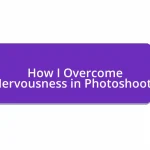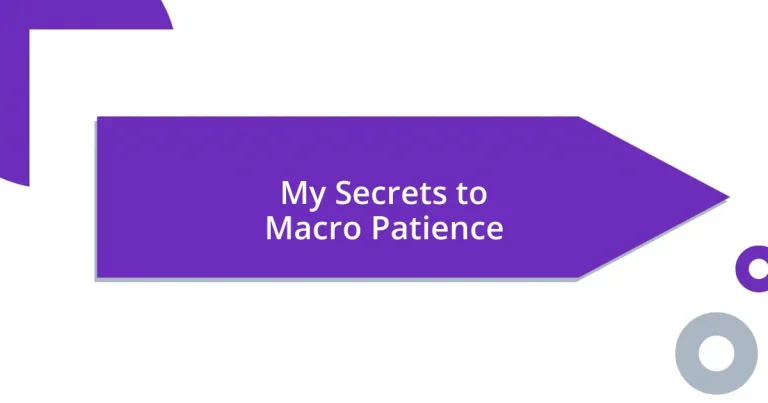Key takeaways:
- Macro patience is essential for achieving long-term goals and fosters resilience through gradual progress.
- Mindfulness techniques, such as meditation and journaling, help cultivate patience and allow for emotional processing during waiting periods.
- Setting realistic expectations and celebrating small milestones enhances motivation and reinforces the value of the journey.
- Regularly tracking progress and being open to adjustments encourages flexibility and supports commitment to the process.
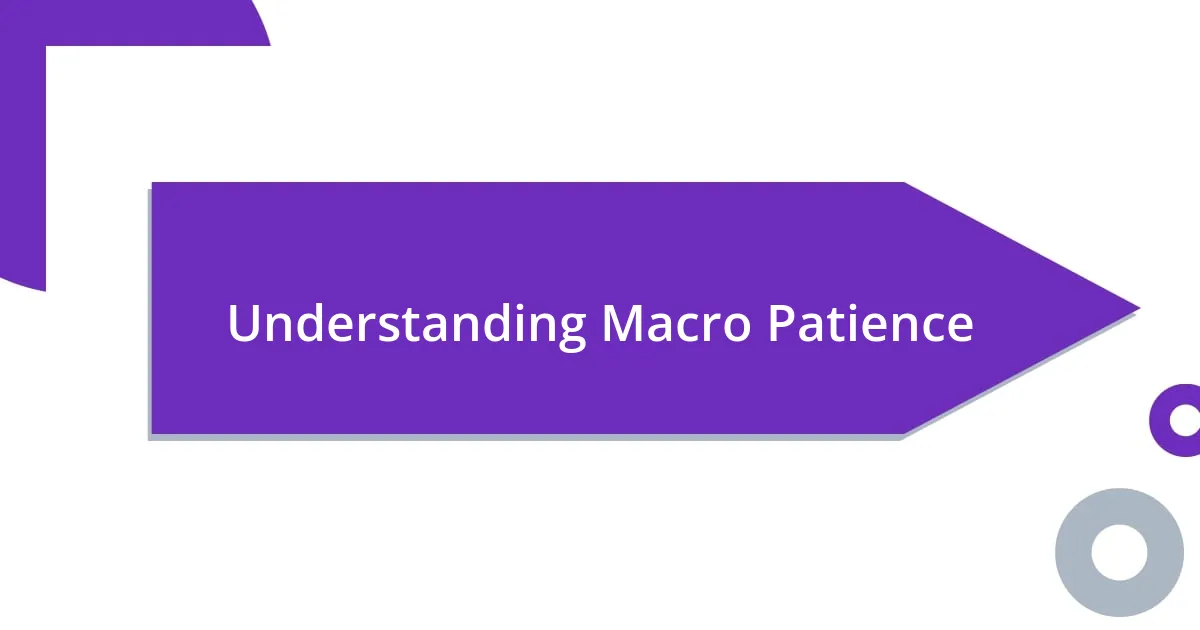
Understanding Macro Patience
When I first began to appreciate the concept of macro patience, it seemed daunting. I recall feeling overwhelmed by the idea of waiting for results that might take months or even years. Isn’t it curious how in a world dominated by instant gratification, we often forget the power of patience as a strategic tool?
Understanding macro patience is all about recognizing that significant achievements require time and consistent effort. I remember a project where I poured countless hours into developing something I believed in, yet no immediate recognition followed. That testing period taught me that sometimes the most worthwhile pursuits are the ones that unfold slowly, revealing their true value over time.
I often ask myself, is the journey worth it if it takes longer than expected? Reflecting on my experiences, I see that the moments of waiting often yield the most profound growth. Embracing macro patience has taught me to appreciate progress in its gradual forms, encouraging a mindset that values persistence and resilience. It reminds me that every step, no matter how small, brings me closer to my long-term goals.
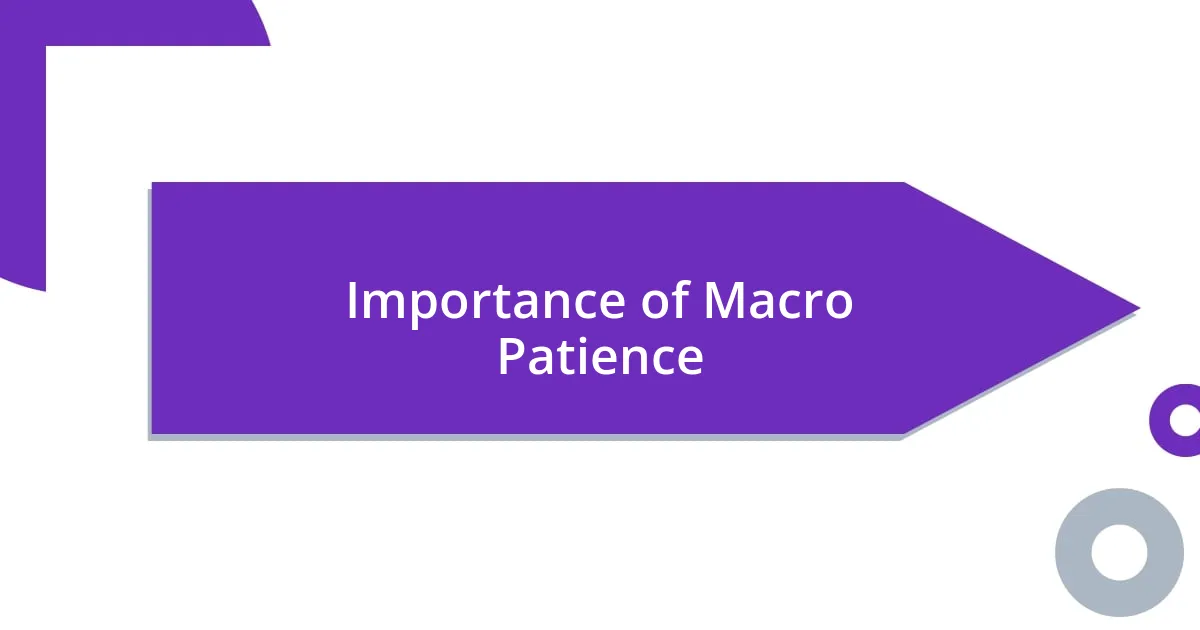
Importance of Macro Patience
Macro patience is essential for achieving long-term goals. I vividly recall a time in my life when I was trying to build a fitness routine. Initially, the results weren’t visible for weeks, and it was tough to stay motivated. However, as time passed, the small daily decisions I made compounded into noticeable change. This experience taught me that the journey’s value often lies not in immediate results, but in the commitment to the process itself.
The importance of macro patience becomes even clearer when we consider how many worthwhile endeavors take years to flourish. I often think about my passion for writing. The first drafts of any piece I created rarely met my expectations. Yet, by practicing regularly and reviewing my work over time, I noticed a significant improvement in my skills. This gradual journey feels rewarding, reminding me that every effort invested builds a solid foundation for future success.
Having macro patience helps in creating a mindset of resilience and adaptability. At one point, I was involved in a startup that faced numerous hurdles. I had to remind myself daily that success was not an overnight achievement. By cultivating patience, I found that I could embrace setbacks as opportunities for learning, ultimately leading to a more fulfilling and sustainable outcome.
| Aspect | Macro Patience |
|---|---|
| Definition | The ability to wait for significant results over time |
| Key Benefits | Promotes deeper learning and resilience |
| Emotional Insight | Fosters a sense of fulfillment in the journey |
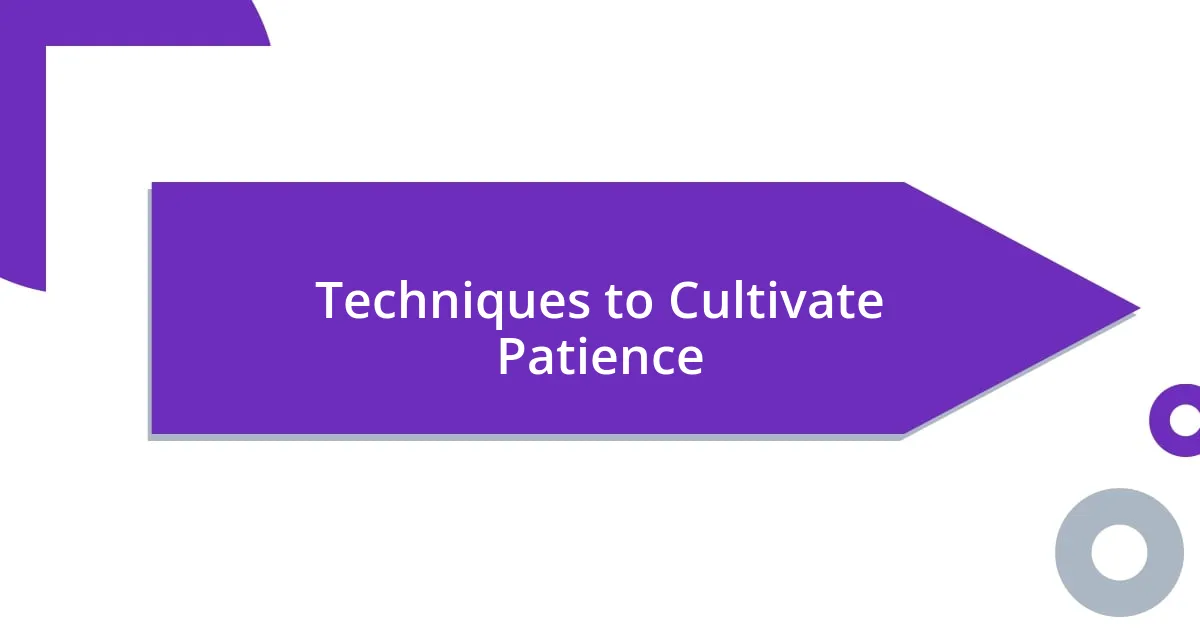
Techniques to Cultivate Patience
One technique I find incredibly helpful in cultivating patience is to practice mindfulness. When I first started meditating, I was shocked at how challenging it was to simply sit still and observe my thoughts. Over time, I learned that these moments of quiet reflection not only calmed my mind but also expanded my capacity to wait without frustration. Embracing the present moment helps me recognize that every second spent in patience is an opportunity for growth.
Here are some techniques that have proven effective for me:
- Mindfulness Meditation: Spending just a few minutes a day observing my breath can significantly increase my patience levels.
- Journaling: Writing about my feelings during times of waiting allows me to process my emotions and gain insight into my impatience triggers.
- Setting Long-Term Goals: Instead of focusing on quick wins, I often remind myself of my overarching objectives, which helps shift my perspective.
- Embracing Challenges: I’ve learned to view obstacles as chances to develop patience, remembering that each hurdle strengthens my resolve.
- Practicing Gratitude: Reflecting on what I’m thankful for during waiting periods helps me appreciate the journey rather than fixating solely on the destination.
I’ve also found that breaking tasks into smaller, manageable parts creates a sense of accomplishment along the way. For instance, during a long writing project, I allocate time for research, drafting, and revising as separate milestones. Celebrating these small victories reinforces my patience, making the larger goal feel less daunting. By gradually building a practice of patience into my daily routine, I become more resilient and better equipped to handle the anticipated delays that life throws my way.
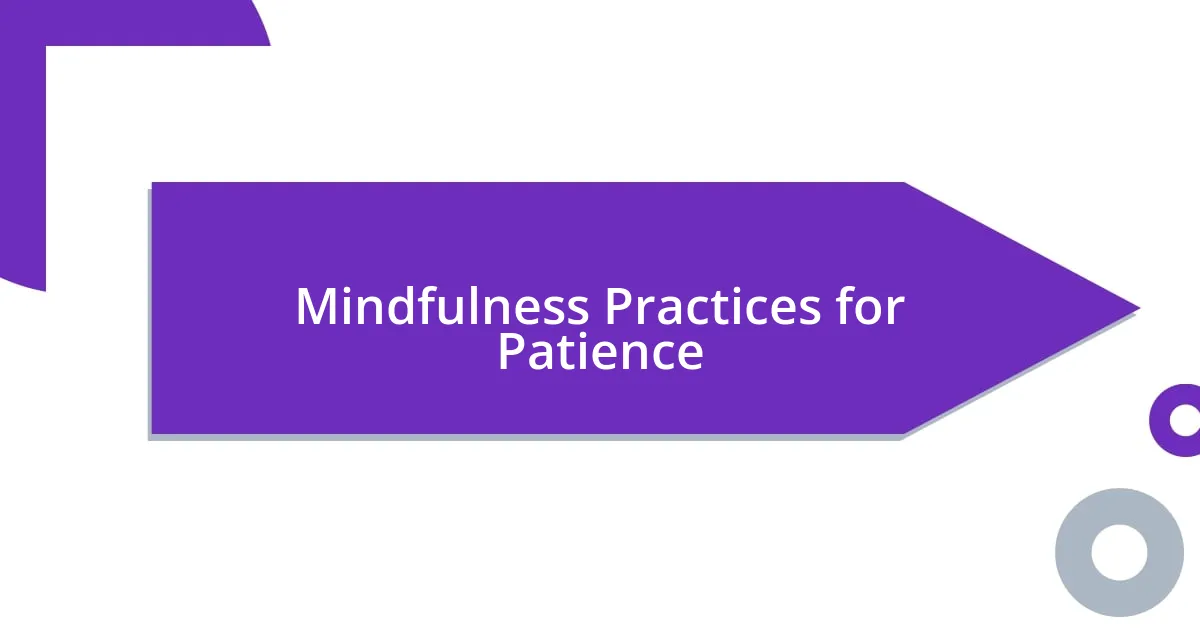
Mindfulness Practices for Patience
I can’t stress enough how mindfulness meditation has reshaped my understanding of patience. When I first sat down to meditate, it felt like an eternity just to focus on my breath. However, as I persisted, those moments of stillness became a refuge. I discovered that by tuning into the rhythm of my breathing, I could anchor myself in the present, allowing impatience to gently fade away. Have you ever noticed how much more clarity you gain when you stop rushing?
Journaling has also played a significant role in my patience journey. There were countless times I found myself waiting for feedback on a project, wrestling with anxiety. I started expressing my thoughts in a journal, capturing my feelings about those moments of uncertainty. The simple act of writing allowed me to externalize my worries, transforming frustration into insights. Have you ever explored your emotions in writing? It’s amazing how much we can learn about ourselves through that process.
Lastly, setting long-term goals has shifted my focus entirely. When I embarked on my journey to become a more mindful individual, I realized that achieving fulfillment often requires a long-term commitment. I began visualizing my aspirations in a broader context rather than just looking for immediate results. This practice not only deepened my patience but enriched my understanding of each step along the way. What larger goals are you passionate about? By keeping those goals in mind, I’ve found that those moments of waiting become not just bearable, but significant chapters in a much bigger story.
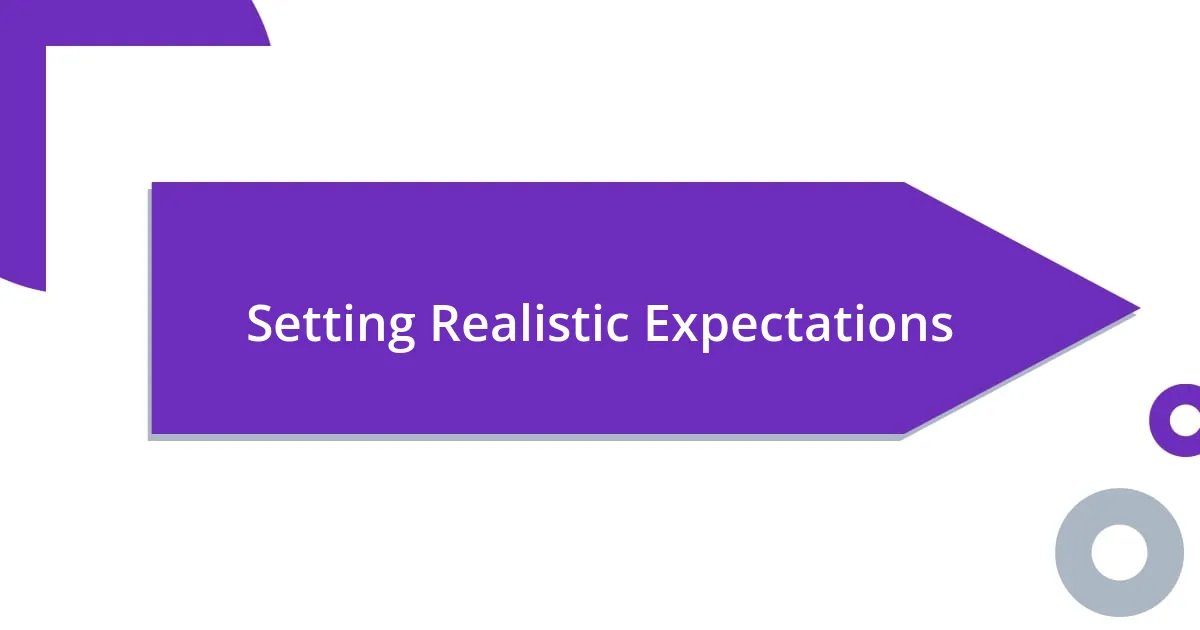
Setting Realistic Expectations
Setting realistic expectations is fundamental in mastering macro patience. I vividly remember a time when I set deadlines for my writing projects that were far too ambitious. The pressure I felt was overwhelming, making me anxious instead of focused. Gradually, I learned that when I set more achievable targets, the stress ebbed away, allowing me to work with clarity rather than chaos. Have you ever set yourself up for failure by aiming too high too soon? I certainly have.
Another key insight I’ve gained is that the journey often takes longer than anticipated. For example, while working on a complex research paper, I expected to finish in just a few weeks. In reality, the process stretched into months, filled with unexpected challenges and learning opportunities. Embracing this reality helped me cultivate a mindset of flexibility. Instead of feeling defeated by these delays, I now recognize them as essential parts of growth. Have you noticed how the path to our goals can often resemble a winding road rather than a straight line?
I also believe that celebrating small milestones can keep motivation levels high. When I completed the first draft of that same research paper, I took a moment to reflect on my progress, acknowledging the effort it took to reach that juncture. This act of recognition reinforced the idea that patience doesn’t mean waiting idly; it means actively appreciating every step of the journey. How do you acknowledge your own achievements? I think these small celebrations offer the perfect opportunity to practice patience in a tangible way.
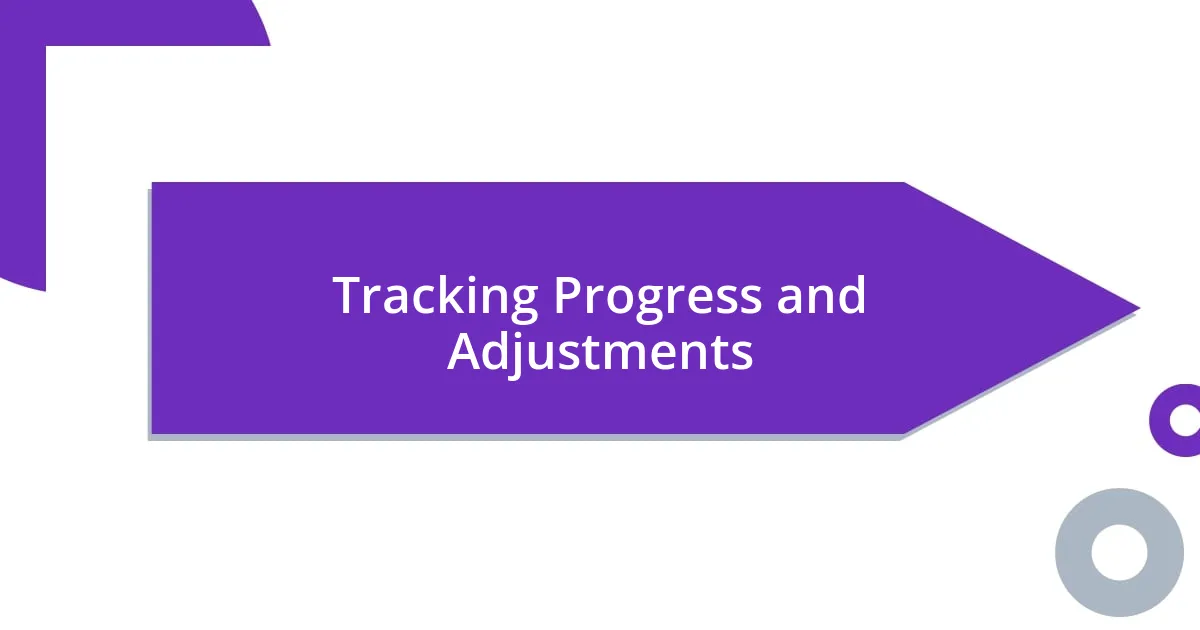
Tracking Progress and Adjustments
Tracking progress is a crucial part of developing macro patience. I’ve always found that keeping a visual record—like a chart or a simple checklist—helps me see how far I’ve come. Just the other day, I looked back at my monthly goals and felt a swell of pride. It’s amazing what documenting those small victories can do for your motivation, isn’t it?
Adjustments, on the other hand, require a keen sense of awareness. There was a time I became so fixated on a specific outcome that I overlooked the signs I needed to pivot. I remember struggling with a personal project, feeling frustrated as I pursued the same flawed approach. It wasn’t until I paused and reflected that I realized a change was necessary. Have you ever been stuck in a routine that just wasn’t working? A gentle nudge to reassess can lead to fresh perspectives and renewed energy.
In my journey of tracking and adjusting, I’ve learned to embrace flexibility. For instance, during a recent fitness regimen, I set an initial timeline that soon became unrealistic. Recognizing that my body needed more time to adapt allowed me to adjust my expectations. I began to appreciate the incremental progress instead of focusing solely on the end goal. Does this resonate with you? Patience isn’t just about waiting; it’s about fostering a mindset that welcomes growth in all its forms.
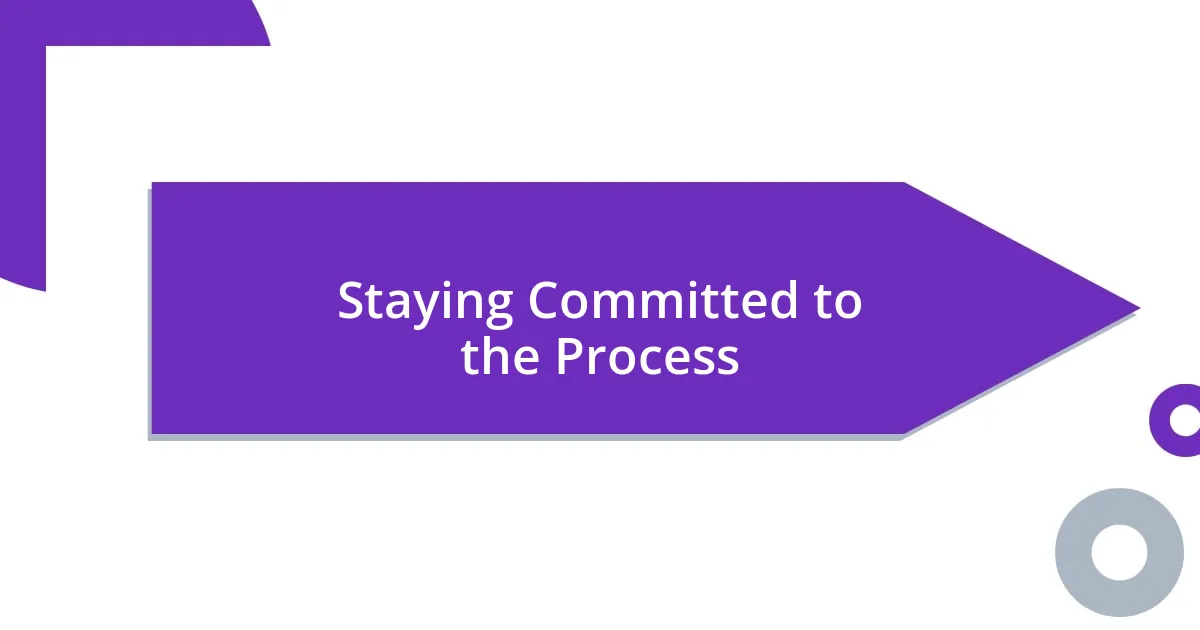
Staying Committed to the Process
Staying committed to the process requires a level of discipline that can often be tested along the way. I remember a time when I joined a slow-paced painting class. Initially, the progress felt torturously slow, but I gradually realized that each session was building my skills in ways I couldn’t immediately see. Have you ever had that feeling of being stuck, only to look back and notice just how far you’ve come? That deep realization often reignites my commitment to the journey.
Another aspect of commitment is the ability to remind ourselves why we started in the first place. I frequently revisit my motivations — whether it’s a desire to express myself, achieve a goal, or simply enjoy the process. For instance, while working on a community project, I often felt disheartened by the slow pace of impact. Reflecting on the initial spark of joy that motivated me helped me push through the harder days, reminding me that progress is sometimes invisible. Isn’t it powerful to reconnect with that driving force?
Sometimes, I find sharing my journey with others keeps me accountable. I have a small group of friends who I update regularly about my progress in various projects. The encouragement and feedback I receive help me maintain focus even when challenges arise. Their support feels like an invisible tether, keeping me grounded in my commitment. Have you ever experienced the difference that a supportive community can make? I can’t stress enough how vital those connections have been in my journey to staying committed.





